Many people invest their money in the financial market in the hope of making a good return. The investment, however, may prove to be risky due to fluctuations in the prices of commodities, currencies, equity, etc.
Such fluctuations may cause all predictions to be incorrect. As a result, the chances of losing your entire investment increase. Therefore, the most crucial consideration of the trader is the risk associated with the financial market and the flow of returns.
Diverse instruments are available that can protect a trader from the risks and volatility of the financial markets.
These instruments not only protect the trader but also guarantee a certain return. Moreover, you’ll be surprised to learn about the types of derivatives markets that exist.
In this article, we will examine different types of financial derivatives and their concepts in detail.
What Are Derivatives?
Derivatives are contracts between two parties whose value is derived from the value of an underlying financial asset. Such contracts are known as derivatives.
Financial derivatives are financial instruments that derive their value from underlying assets. The value of the underlying asset changes according to market conditions.
It is possible to trade derivatives by predicting the future price movement of the underlying asset.
The derivatives contracts are widely used to speculate and earn good returns. They are used for various purposes, such as hedging, gaining access to additional assets, etc.
Different Types Of Derivatives In India
A derivative can be traded in the Indian stock market in four different ways. Different types of derivatives have different contract conditions, risk factors, etc.
The following are the different types of derivatives:
- Future Contracts
- Forward Contracts
- Options Contracts
- Swap Contracts
Future Contract
The futures contract represents an agreement to purchase or sell an underlying instrument at a future date at a specified price. Such type of agreement is known as a Future Contract.
The buyer and seller of the futures contract do not need to meet to reach an agreement. The agreement is reached through an exchange.
The counterparty risk is very low since the futures contract is standardized.
Additionally, the clearinghouse acts as a counterparty to the parties to the contract, thereby reducing the credit risk. Standardized contracts are fixed in size and are regulated by the stock exchange.
Due to the listed nature of the futures contracts on the stock exchange, these contracts cannot be modified in any way. Future contracts have a predetermined format, a predetermined expiration period, and a predetermined size.
Futures contracts require an initial margin as collateral, and settlement is completed every day.
Forward Contract
The Forward Contract is a contract between two parties to purchase or sell an underlying asset at a future date and a special price. This type of derivative is referred to as a forward contract.
A forward contract is an agreement between the parties to sell something in the future. These contracts are customized and have high counterparty risk.
The size of the contract depends on the duration of the contract since it is customized. A forward contract is self-regulated, and collateral is not required.
The forward contract’s settlement occurs at maturity, and the forward contract must be reversed by the expiration date.
Option Contract
Option contracts are a contract that provides the option to buy or sell the underlying asset without being obliged to do so. Such a contract is known as an option contract.
There are two types of options: call and put. Options contracts are very different from futures and forwards contracts, as there is no obligation to discharge the contract at a specific time.
The buyer of a call option has the right to acquire an underlying asset at a price that is determined when the option is entered into. The buyer has the option to settle the contract on or before the expiration date in both contracts.
Anyone trading in the options contract can, therefore, take any of the four positions, i.e., long or short, in either a put option or a call option. The options are traded in the over-the-counter market as well as on the stock exchange.
Swap Contract
A swap contract is a contractual agreement between two parties to exchange financial instruments or cash flows to exchange payments. This type of contract is called a swap contract.
Among the various types of derivatives contracts, swap contracts are the most complex. Swap agreements are private agreements between two parties.
The parties to the contract agree to exchange future cash flows by a predetermined formula. Under swap contracts, interest rates or currencies are the underlying securities.
The fact that both interest rates and currencies are volatile makes swap contracts risky. The parties to swap contracts are protected from a variety of risks. The contracts are not traded on exchanges, and investment bankers act as the middlemen.
Conclusion
In addition, derivatives and derivative forms can be an excellent tool for experienced investors who wish to park their surplus funds and generate a profit, as well as risk-averse hedgers.
Investment experience and market knowledge are essential prerequisites that cannot be obtained without investing in these contracts.
To conclude, derivatives contracts such as forwards, futures and options are among the most effective hedging instruments available. Traders can predict future price movements and benefit from them.
Recommended:
Disadvantages Of Bracket Order
What is Long Unwinding In Share Market?
Types of Shares & Their Importance
Frequently Asked Questions
Which Is The Oldest Type Of Derivative?
The forward contract is the simplest type of available derivative today. It is also the oldest type of derivative. Forward contracts are simply agreements to sell something at a future date.
Are Derivatives Good Or Bad?
The widespread trading of these instruments is good and bad because although derivatives can reduce portfolio risk, highly leveraged institutions can suffer substantial losses if their positions move against them.
What Are OTC Derivatives?
Over-the-counter derivatives are financial instruments that are not traded on exchanges and can be tailored to meet the needs of each party. The most common underlying assets are
What Are The Types Of Commodity Derivatives?
These derivatives markets involve two types of contracts: futures and forwards. These derivatives use the spot market as the underlying asset and allow the owner to take control of the asset at a point in the future for a price agreed upon in the present.
What Are The Dangers Of Derivatives?
The goal of derivatives is to increase or decrease an investor’s exposure to four types of risk – Stock Market Risk, Commodity Risk, Credit Risk, And Interest Rate Risk.



